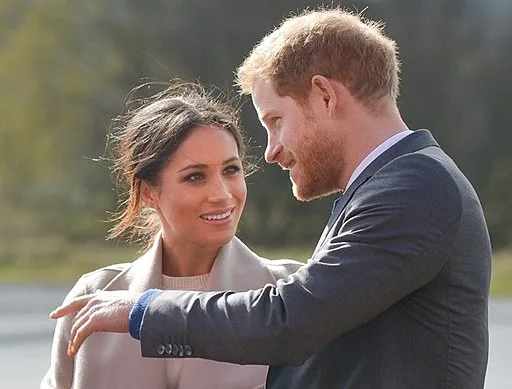PR expert blames mismanaged communications for the Sussexes’ fall from favour, as they struggle to regain their public image after leaving the royal family
Meghan Markle and Prince Harry’s post-royal ventures have struggled to gain public approval, but their decreasing popularity is not necessarily due to personal shortcomings. According to public relations expert Edward Coram-James, the couple’s mismanaged PR strategies are at the heart of their fall from favour.
Since stepping back from their royal duties, the Duke and Duchess of Sussex have embarked on various media deals, such as partnerships with Netflix and Spotify, as well as public speaking engagements. However, these projects have been met with lukewarm receptions, leaving many to speculate about the reasons behind their struggle to connect with audiences. Coram-James suggests that poor PR planning and execution, rather than any personal fault, have shaped the couple’s negative public image.
Embed from Getty ImagesIn an interview with Express.co.uk, Coram-James explained that the couple’s initial PR strategy, especially following their high-profile exit from the Royal Family, alienated them from the public. “It’s not that they’re bad people,” Coram-James clarified. “They might be kind and caring individuals, but their communication strategies were flawed.”
A prime example of their PR missteps was the rollout of their tell-all documentary and interviews. While the couple attempted to present their side of the story, many perceived the approach as one-sided and disconnected from public sentiment. This left them vulnerable to criticism, not only from royalists but also from those who felt the couple had chosen the wrong path to win sympathy.
The expert further noted that public relations, when handled incorrectly, can make even well-meaning individuals appear disingenuous or divisive. As the Sussexes began to rely on sensational revelations about their royal experiences, they failed to build a more cohesive, positive narrative about their personal endeavours, focusing instead on the controversy.
Recent developments indicate the couple may be learning from their mistakes, with reports suggesting a shift towards more refined communication strategies. However, rebuilding trust and regaining popularity remain significant challenges for Meghan and Harry.
As Coram-James highlights, PR mishandling can alter public perception in ways that are difficult to reverse. Now, the Sussexes must navigate the complexities of their public image as they strive to re-establish themselves outside the monarchy.
Analysis:
- Political:
Meghan and Harry’s struggles with public perception have political underpinnings due to their high-profile exit from the Royal Family. Their departure created a political vacuum in royal circles, and their subsequent actions, including public criticism of the monarchy, sparked debates about the role of the Royal Family in modern Britain. Their PR missteps exacerbated these tensions, aligning them with global social justice causes while distancing them from traditional royal duties. This has placed them in a precarious political position—neither fully tied to the British monarchy nor entirely embraced by global progressive movements. - Social:
The couple’s decline in popularity reflects broader social debates about class, privilege, and celebrity culture. Many saw Meghan and Harry’s complaints as out of touch with the realities of ordinary people, especially in the wake of economic hardships following the COVID-19 pandemic. Their image, once one of hope for modernizing the Royal Family, has since become tarnished by accusations of hypocrisy—advocating for causes like mental health and inequality while living a life of immense privilege. Their PR failures allowed these critiques to overshadow the positive social change they intended to champion. - Racial:
Racial undertones have always played a significant role in Meghan Markle’s experience with the media and the public. As a biracial woman, Meghan’s entrance into the Royal Family was seen as a step towards inclusivity, but her experience revealed the challenges that come with breaking traditional barriers. The PR mismanagement surrounding the couple’s claims of racism within the Royal Family polarized public opinion, with some defending the couple and others accusing them of exploiting race for personal gain. This racial aspect remains a key element of their public struggles, as they aim to address systemic issues while navigating their own complicated relationship with the monarchy and media. - Gender:
Gender dynamics are also central to Meghan’s portrayal in the media. Often depicted as the dominant force behind the couple’s decisions, Meghan has faced gendered critiques that question her role in guiding Harry’s separation from the Royal Family. The PR mishandling allowed these stereotypes to persist, reinforcing traditional narratives about ambitious women who challenge societal norms. For Meghan, overcoming these gendered attacks requires more than just reshaping public relations; it demands a recalibration of her image as both an independent leader and a partner in a high-profile marriage. - Economic:
The economic ramifications of the couple’s PR failures cannot be ignored. Since stepping away from royal duties, Meghan and Harry have relied on their personal brand to secure financial independence. However, their lacklustre public image has directly impacted the success of their media deals and commercial ventures. Their inability to connect with audiences has reduced the marketability of their brand, making it harder for them to attract lucrative opportunities. This illustrates the broader economic impact of public perception, especially for individuals whose income depends on maintaining a favourable reputation.
As the couple navigates their post-royal life, they must consider the long-term economic consequences of their image. Building a successful career outside the monarchy will require not only financial acumen but also a keen understanding of how to restore their public standing. Their ongoing PR efforts will play a critical role in determining whether they can achieve this balance
